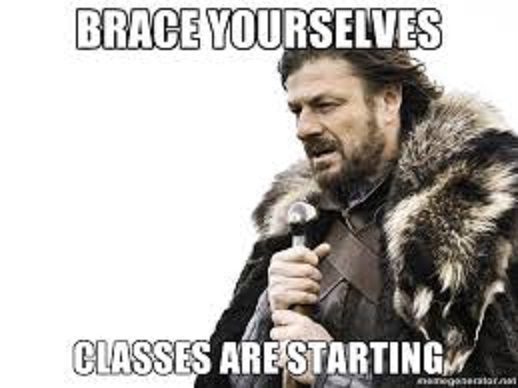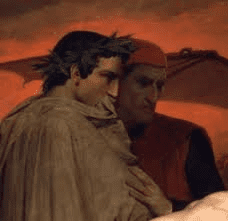In last few minutes of Franco Zefferelli’s Jesus of Nazareth, Zerah pokes his head into the tomb where he observed the dead Jesus of Nazareth being buried three days earlier. Zerah is a politically astute, power-hungry Pharisee who has been an enemy of Jesus since he first heard about the roving rabbi three years earlier. Zerah is the one who manipulates Judas into betraying Jesus. Zerah is the one who convinces the Romans to put a beefed-up military presence in front of the tomb just in case Jesus’ disciples try to steal the corpse and claim that Jesus has risen from the dead.
Of course, the tomb is empty. As Zerah looks at the neatly folded clothes on the slab where the body had been placed, he says . . . “Now it begins.” Zerah knows that this is a classic “the horse has been let out of the barn” or “the genie has been let out of the bottle” moment. Nothing will ever be the same again. And he’s right. For a college professor, especially one who is returning to the classroom for the first time in seven months because of sabbatical as I am, Zerah’s observation strongly resonates.
Today is the first day of the spring semester at my college. Everyone has stories, many of them of the horror variety, about the first day of school—mine were full of cognitive and emotional dissonance from my earliest years. On the one hand, I couldn’t wait for school to start—I’ve loved just about everything about the life of learning ever since I can remember. On the other hand, there was all that non-learning stuff that I was not good at. Meeting new people. Sports. Leaving my mother and my dogs at home every morning. Riding the bus for a half hour each way. Come to think of it, I probably would have loved home schooling. I doubt my parents would have.

For a college professor, the first day of the semester requires answering an eternal question—what to do with students whom you have never met, who are coming off either summer or Christmas vacation, who might have spent the previous night getting in a final party before attempting to get serious about their education for at least a week or so, and who are assuming that all we are going to do during our first class meeting is go over the syllabus and leave early? I have some professor colleagues who, assuming that all the above is true, descend to their new students’ expectations and dismiss class after a brief overview of the syllabus and the upcoming semester. I am not one of those professors. At the beginning of the first day of the semester, I give a reading quiz.
This, of course, means that my students have a reading assignment that they are required to complete for our first meeting of the semester. This is easy enough to arrange—I have the class roster available several weeks before the semester begins, so a simple email, followed by at least a dozen reminders in the following days before the semester begins, provides my students-to-be with the course syllabus, other pertinent data, and the first day’s reading assignment (with the promise of a quiz). I often notice a drop of five or six students in my class roster in the day or two after sending this email, which is a good thing (see below). I usually receive a bit of email pushback from my students-to-be (“My other classes aren’t requiring a reading or having a quiz on the first day”), so why do I do this? For a number of reasons.
- One advantage, as noted earlier, is roster control. Unfortunately, because my classes tend to fill up quickly and are often of the core curriculum variety that students have to take, every student who leaves my roster for a more palatable first day experience is immediately replaced by someone else (who doesn’t necessarily know about the first day reading and quiz—hence the multiple email reminders).
- The amount of classroom time I have in a given semester with my students is limited. Throwing away the first of those meetings sends the message that either our time together is unlimited or that it isn’t important enough to squeeze value out of every scheduled moment. Neither of these is true.
- Many of my courses (two-thirds of them this semester) are filled exclusively with freshmen. Nothing says “this isn’t high school or Kansas anymore” to a first-week college student than for them to hit the ground running—hard.
I’m happy to report that in most of the interdisciplinary courses I have taught over the past many years, my teammates have been happy to join me in assigning significant work for the first class. For instance several years ago, my colleague and I assigned the entire Iliad for freshman summer reading, building on it through the first two weeks of the semester. It’s amazing what you can get freshmen to do without complaining.
Other than making the first day of school a difficult one for my students, what am I really up to as I return to the classroom this week? As a professor, I am a facilitator of lifetime learning, a person who points students in fruitful directions, helping them identify and become skillful in the use of tools that will help them construct their own moral frameworks intelligently. The liberally educated lifetime learner is equipped both to seek and create meaning throughout her life. I take pride in playing a part in this process. I have thought a lot over the past three decades about the day-to-day dynamic between professor and student; I continually return to the difference between an idol and an icon.
 The role of a professor is to be Virgil to the student’s Dante, guiding the educational journey, relying on knowledge and experience to point out the pitfalls and attractions of a journey that each person must encounter individually. The professor helps the student learn to identify what is important and what is not in the perpetual sifting process of education. The professor is not the main attraction at any point in this process. The professor is an icon—something to look through or past, in other words—rather than an idol—something to look at.
The role of a professor is to be Virgil to the student’s Dante, guiding the educational journey, relying on knowledge and experience to point out the pitfalls and attractions of a journey that each person must encounter individually. The professor helps the student learn to identify what is important and what is not in the perpetual sifting process of education. The professor is not the main attraction at any point in this process. The professor is an icon—something to look through or past, in other words—rather than an idol—something to look at.
There is a reason that the Second Commandment is a prohibition against idolatry. Human beings are inveterate idolaters, more than happy to pattern themselves after someone or something else rather than to take on responsibility for themselves. For those who are interested in creatively addressing the undoubtedly real shift in higher education toward preparation for a good job and financial success that has been going on for a while now, I highly recommend iconography.












